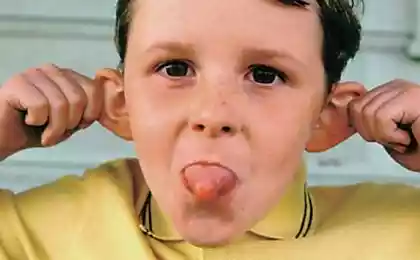497
6 unexpected ways to influence our behavior
Sometimes there with you is that you do not behave the way you would have liked or seemed right? Suddenly showed aggression, ceased to follow a diet or angry due to large traffic jams on the way home? It's all about triggers , ie the incentives that influence our behavior. It was under the influence of these incentives, we intuitively decide how to behave in a particular situatsii.V publishing house "Mann, Ivanov and Ferber" book "triggers", which examines in detail the behavior of the person. < Website I have allocated six of the most interesting facts from this book.

1. The trigger behavior can be direct or kosvennymPryamye triggers - stimuli that directly and visibly affect our behavior, without any intermediate steps between them and your response. You see a happy baby and smiling. Child in pursuit of basketball runs out into the street in front of your car - you hit the brakes. Indirect triggers go a roundabout way. You see the family photo, which causes the flow of thoughts, and it motivates you to pick up the phone and call my sister.
2. A trigger can be internal or vneshnimVneshnie triggers appear from the environment and attack all five of our senses, as well as our minds. Internal triggers are generated from within - our thoughts and feelings, which are not connected to any external stimuli. Many people meditate, to drown out the internal triggers, or "inner voice." For example, the idea that it is not clear why there is in your head when you're alone to ponder over some problem is an internal trigger that determines your actions. Its origin can be a mystery, but it is no less important than the external stimulus.
3. A trigger can be conscious or bessoznatelnymSoznatelnye triggers require awareness. Do you know why your finger is drawn aside, when you touch a hot plate. Unconscious triggers determine the behavior outside of your consciousness. For example, no matter how much people talk about the weather, they usually do not think about how much it affects their mood, even defines it. To the question "How are you happy?", Respondents generally give more positive responses, if the court of the perfect weather, what if it is vile. But those same people deny that the weather affects their response. Weather is a trigger that changed their assessment, but it was out of their mind.
4. The trigger can be predictable or neozhidannymMy far off feel predictable triggers. For example, at the start of a football match, we hear the anthem and expect the roar of applause when he finished. The song is a predictable reaction. This is true for a negative reaction. We know that obscene language provokes anger, so try to avoid it. Unexpected triggers caught us by surprise and stimulate new forms of behavior.
5. Trigger can inspire or raskholazhivatVdohnovlyayuschie triggers are pushing us to continue operations or even more hard work. They give strength. Type finish line encouraging the exhausted marathon runner to run, and even accelerate the pace. The same effect on him and the opponent is a side view, which is about to overtake him. Dampen triggers call to stop or at least slow down. If we talk in the theater, irritated "! Sh-sh-sh" from the person in the room helps us to understand that we prevent people - and we stop talking
6.. The trigger can be productive or neproduktivnymEto important. Productive triggers pushing us forward to that, to become who we want to be. Unproductive trigger is pulled back. Triggers are not "good" or "bad." The main thing - our reaction to them
. For example, one child a good and caring parents can cause a positive perception, and the other is to believe that his "strangled in his arms." Parents of two or more children are well aware of, as it happens. The same dedication and care may cause thanks one child and another rebellion. The same parents. The same triggers. The reactions are different.
Other interesting facts about the behavior of the person looking at the book
«Triggers". via factroom.ru

1. The trigger behavior can be direct or kosvennymPryamye triggers - stimuli that directly and visibly affect our behavior, without any intermediate steps between them and your response. You see a happy baby and smiling. Child in pursuit of basketball runs out into the street in front of your car - you hit the brakes. Indirect triggers go a roundabout way. You see the family photo, which causes the flow of thoughts, and it motivates you to pick up the phone and call my sister.
2. A trigger can be internal or vneshnimVneshnie triggers appear from the environment and attack all five of our senses, as well as our minds. Internal triggers are generated from within - our thoughts and feelings, which are not connected to any external stimuli. Many people meditate, to drown out the internal triggers, or "inner voice." For example, the idea that it is not clear why there is in your head when you're alone to ponder over some problem is an internal trigger that determines your actions. Its origin can be a mystery, but it is no less important than the external stimulus.
3. A trigger can be conscious or bessoznatelnymSoznatelnye triggers require awareness. Do you know why your finger is drawn aside, when you touch a hot plate. Unconscious triggers determine the behavior outside of your consciousness. For example, no matter how much people talk about the weather, they usually do not think about how much it affects their mood, even defines it. To the question "How are you happy?", Respondents generally give more positive responses, if the court of the perfect weather, what if it is vile. But those same people deny that the weather affects their response. Weather is a trigger that changed their assessment, but it was out of their mind.
4. The trigger can be predictable or neozhidannymMy far off feel predictable triggers. For example, at the start of a football match, we hear the anthem and expect the roar of applause when he finished. The song is a predictable reaction. This is true for a negative reaction. We know that obscene language provokes anger, so try to avoid it. Unexpected triggers caught us by surprise and stimulate new forms of behavior.
5. Trigger can inspire or raskholazhivatVdohnovlyayuschie triggers are pushing us to continue operations or even more hard work. They give strength. Type finish line encouraging the exhausted marathon runner to run, and even accelerate the pace. The same effect on him and the opponent is a side view, which is about to overtake him. Dampen triggers call to stop or at least slow down. If we talk in the theater, irritated "! Sh-sh-sh" from the person in the room helps us to understand that we prevent people - and we stop talking
6.. The trigger can be productive or neproduktivnymEto important. Productive triggers pushing us forward to that, to become who we want to be. Unproductive trigger is pulled back. Triggers are not "good" or "bad." The main thing - our reaction to them
. For example, one child a good and caring parents can cause a positive perception, and the other is to believe that his "strangled in his arms." Parents of two or more children are well aware of, as it happens. The same dedication and care may cause thanks one child and another rebellion. The same parents. The same triggers. The reactions are different.
Other interesting facts about the behavior of the person looking at the book
«Triggers". via factroom.ru
The mystery of the Roman catacombs: eerie ancient skeletons, covered with precious stones
This incredible mom weaves braids her daughter every morning before school























